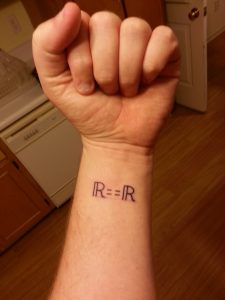 Moments ago, I wrote the Featured New Release of the Week post for this week, which features Perfectly Good Crime by Dete Meserve. I spent a large part of this review speaking about something that was the thing about this book that primarily resonated with me and intrigued me about this book, yet I felt it was a spoiler to reveal it. Other reviews have since already spoiled this particular topic, but even now I feel the need to hide the rest of this commentary behind a Continue Reading tag, so if you are reading beyond this point,
Moments ago, I wrote the Featured New Release of the Week post for this week, which features Perfectly Good Crime by Dete Meserve. I spent a large part of this review speaking about something that was the thing about this book that primarily resonated with me and intrigued me about this book, yet I felt it was a spoiler to reveal it. Other reviews have since already spoiled this particular topic, but even now I feel the need to hide the rest of this commentary behind a Continue Reading tag, so if you are reading beyond this point,
READER BEWARE: I CONSIDER THE BELOW DISCUSSION TO CONTAIN SPOILERS TO THIS BOOK!
If you’re still reading, you clearly don’t mind at least minor spoilers, so let’s continue, shall we? (One last chance to turn away! 😉 )
The mystery of this book turns out to revolve around the legend of Robin Hood, and Meserve does an outstanding job of balancing both sides of the story as is is traditionally understood in the modern context while at the same time bringing it into the modern era in spectacular fashion.
 But as I said in the Featured New Release of the Week post, I happen to have a perspective of Robin Hood that while not unique is demonstrably rare in the United States. I am someone who has read Ayn Rand’s Atlas Shrugged three times, including twice in my eReader era – a distinction literally no other book can best thus far and even has a tattoo that is the subheading of one of the three parts of the book, as seen in the pic to the right. Thus, the take on the legend discussed in that book is the one I tend to adhere to, despite not being a “pure” Objectivist myself. Here is that take:
But as I said in the Featured New Release of the Week post, I happen to have a perspective of Robin Hood that while not unique is demonstrably rare in the United States. I am someone who has read Ayn Rand’s Atlas Shrugged three times, including twice in my eReader era – a distinction literally no other book can best thus far and even has a tattoo that is the subheading of one of the three parts of the book, as seen in the pic to the right. Thus, the take on the legend discussed in that book is the one I tend to adhere to, despite not being a “pure” Objectivist myself. Here is that take:
“It is said that [Robin Hood] fought against the looting rulers and returned the loot to those who had been robbed, but that is not the meaning of the legend which has survived. He is remembered, not as a champion of property, but as a champion of need, not as a defender of the robbed, but as a provider of the poor. He is held to be the first man who assumed a halo of virtue by practicing charity with wealth which he did not own, by giving away goods which he had not produced, by making others pay for the luxury of his pity. He is the man who became the symbol of the idea that need, not achievement, is the source of rights, that we don’t have to produce, only to want, that the earned does not belong to us, but the unearned does. He became a justification for every mediocrity who, unable to make his own living, has demanded the power to dispose of the property of his betters, by proclaiming his willingness to devote his life to his inferiors at the price of robbing his superiors. It is this foulest of creatures — the double-parasite who lives on the sores of the poor and the blood of the rich — whom men have come to regard as a moral ideal. And this has brought us to a world where the more a man produces, the closer he comes to the loss of all his rights, until, if his ability is great enough, he becomes a rightless creature delivered as prey to any claimant — while in order to be placed above rights, above principles, above morality, placed where anything is permitted to him, even plunder and murder, all a man has to do is be in need. Do you wonder why the world is collapsing around us? That is what I am fighting… Until men learn that of all human symbols, Robin Hood is the most immoral and the most contemptible, there will be no justice on earth and no way for mankind to survive.”
— Ragnar Danneskjöld in Ayn Rand’s Atlas Shrugged, Part II, Chapter VII
In Perfectly Good Crime, Meserve repeatedly shows “Robin Hood”‘s ill-gotten gains doing quite a bit of good for the poor. Feeding them. Giving them the money to get college educations. More. And one of the victims of the thefts at the center of the mystery actually defends “Robin Hood”, repeatedly making points revolving around how he and the other robbery victims have so much money that even the millions stolen in these robberies don’t begin to even make them flinch about it being gone.
Rand was no fan of inherited wealth – she didn’t support a tax on it, but she believed a man (or woman) was worth exactly what they personally produced. And she believed that no matter how “obscene” the amount of money one was worth, if they produced that money themselves it was theirs and no one else had any claim on it whatsoever.
Indeed, “Robin Hood” in Perfectly Good Crime is exactly the version Rand so detested – stealing from those who produced and providing to the poor, and for all the points Meserve makes on “both” sides of the argument as currently understood in the majority American political discussion, she never considers an alternative perspective such as that of Rand’s.
Go read Perfectly Good Crime. It really is an excellent book. But make the next book you read after it be Atlas Shrugged – it is also an excellent book, even ignoring its philosophy and simply looking at it as a novel about a woman’s desperate attempts to save her family’s company.
And then think of how both books portray the concepts of need, of production, of wealth,… and of Robin Hood. Think hard and critically of these things, and decide where you stand on them not because of what you have been told, but because of the evidence you have seen.
Do that, and not only will you have been entertained for many hours across two books, but you will have grown as a result.
